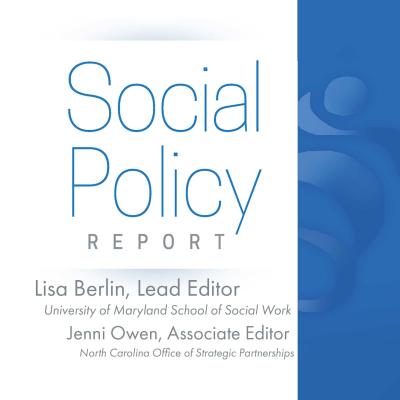The Social Policy Report (SPR) is published three to four times per year. Its purpose is twofold:
- To provide policymakers and affiliated audiences (including elected officials, government agency staff, program developers, and practitioners) with comprehensive, non-partisan reviews of child development research findings to inform decision-making.
- To inform SRCD members about (a) policy issues related to child development and (b) child development research related to such issues.
The Social Policy Report provides a forum for scholarly reviews and discussions of policy considerations stemming from child development research findings. Topics come from a variety of disciplines and cover a wide range of issues such as health care, parenting, and education.
SRCD recognizes that many policy issues are controversial and that authors may have a “point of view,” but the SPR is not intended to be a vehicle for authors to advocate policy positions or to make specific policy recommendations. Rather, authors should provide timely and relevant child development research findings for policymakers and affiliated audiences to consider in their decision-making.
For example, a SPR should not make a recommendation that the federal government reinstate the child tax credit that was part of the American Rescue Plan Act (ARPA) of 2021. But a SPR could provide actionable findings on the impacts and implications of the child tax credit on child outcomes, such as, Strong Research Evidence Supports the ARPA Child Tax Credit as a Mechanism for Reducing Child Poverty.
Each SPR will include a disclaimer that the views expressed do not necessarily reflect those of SRCD or the editors.

Social Policy Report Editorial Board
Browse Recent Social Policy Reports
Volume 31 (2018) - Volume 37 (2024)
Social Policy Reports published before 2018 can be found in the Social Policy Report Archives. Some archived Reports are available in PDF format to view and download whereas others are for reference only.
2024
Creating Partnerships among Researchers, Practitioners, and Policymakers to Maximize Evidence Use
Volume 37, Number 1
Special issue featuring essays by Jenni Owen, Cynthia Osborne, Dianne Haulcy, Vivan Tseng
read full report
2023
Preventing adolescent suicide: Recommendations for policymakers, practitioners, program developers, and researchers
Volume 36, Number 2 & 3
Pamela Morris-Perez, Rachel Abenavoli, Adam Benzekri, Sarah Rosenbach-Jordan, and Gianna Rose Boccieri
The Unintended Consequences of “Lack of Supervision” Child Neglect Laws: How Developmental Science Can Inform Policies about Childhood Independence and Child Protection
Volume 36, Number 1
Rachel M. Flynn, Nicholas J. Shaman, and Diane L. Redleaf
read full report
2022
The Role of Policy in Shaping and Addressing the Consequences of Parental Incarceration for Child Development in the United States
Volume 35, Number 3
Brittany P. Mihalec-Adkins and Rebecca Shlafer
“Wearing a Mask Won't Protect Us from Our History”: The Impact of COVID-19 on Black Children and Families
Volume 35, Number 2
Erin Bogan, Valerie N. Adams-Bass, Lori A. Francis, Noni K. Gaylord-Harden, Eleanor K. Seaton, Judith C. Scott, and Joanna L. Williams
Transforming Policy Standards to Promote Equity and Developmental Success Among Latinx Children and Youth
Volume 35, Number 1
Lorena Aceves, Daniel Max Crowley, Brenda Rincon, and Diamond Y. Bravo
2021
COVID-19 and Resilience in Schools: Implications for Practice and Policy
Volume 34, Number 3
Suniya S. Luthar, Lisa S. Pao, and Nina L. Kumar
Read Full Report
The United States Should Recognize and Support CaregivingYouth
Volume 34, Number 2
Emma Armstrong-Carter, Catherine Johnson, Julie Belkowitz, Connie Siskowski, and Elizabeth Olson
Read Full Report
Seeking Safety and Humanity in the Harshest Immigration Climate in a Generation: A Review of the Literature on the Effects of Separation and Detention on Migrant and Asylum‐Seeking Children and Families in the United States during the Trump Administration
Volume 34, Number 1
Kelly L. Edyburn and Shantel Meek
2020
Foster Care: How We Can, and Should, Do More for Maltreated Children
Volume 33, Number 3
Sarah A. Font and Elizabeth T. Gershoff
Children and Violence: Nurturing Social‐Emotional Development to Promote Mental Health
Volume 33, Number 2
Tina Malti
What Policies Advance Infants and Toddlers? Evidence to Inform State and Federal Options
Volume 33, Number 1
Bruce Fuller, Margaret Bridges, and Austin Land
2019
Leveraging Research on Informal Learning to Inform Policy on Promoting Early STEM
Volume 32, Number 3
Michelle A. Hurst, Naomi Polinsky, Catherine A. Haden, Susan C. Levine, and David H. Uttal
Strengthening Social Programs to Promote Economic Stability during Childhood
Volume 32, Number 2
Bradley Hardy, Heather D. Hill, and Jennie Romich
Digital Games as a Context for Children's Cognitive Development: Research Recommendations and Policy Considerations
Volume 32, Number 1
Fran C. Blumberg, Kirby Deater‐Deckard, Sandra L. Calvert, Rachel M. Flynn, C. Shawn Green, David Arnold, and Patricia J. Brooks
2018
Disparities in the Quality of Pediatric Dental Care: New Research and Needed Changes
Volume 31, Number 4
Stephanie M. Reich, Kristin S. Hoeft, Guadalupe Díaz, Wendy Ochoa, and Amy Gaona
Read full Report Social Policy Report Brief - English Social Policy Report Brief - Español
Applying a Community Violence Framework to Understand the Impact of Immigration Enforcement Threat on Latino Children
Volume 31, Number 3
R. Gabriela Barajas-Gonzalez, Cecilia Ayón, and Franco Torres
Read full Report Social Policy Report Brief
Changing Demographics of Dual Language Learners and English Learners: Implications for School Success
Volume 31, Number 2
Harriet D. Romo, Kevin J. A. Thomas, and Eugene E. García
Read full Report Social Policy Report Brief
Toward High-Quality Early Childhood Development Programs and Policies at National Scale: Directions for Research in Global Contexts
Volume 31, Number 1
Hirokazu Yoshikawa, Alice J. Wuermli, Abbie Raikes, Sharon Kim, and Sarah B. Kabay